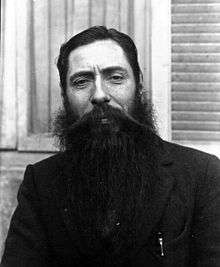François Mayoux
| François Mayoux | |
|---|---|
 François Mayoux c. 1920 | |
| Born |
24 June 1882 Beaulieu-sur-Sonnette, Charente, France |
| Died |
21 July 1967 (aged 85) La Ciotat, Bouches-du-Rhône, France |
| Nationality | French |
| Occupation | Teacher |
| Known for | Anarcho-syndicalism |
François Mayoux (24 June 1882 – 21 July 1967) was a French teacher who became in turn a socialist, communist and revolutionary syndicalist. He and his wife Marie Mayoux were imprisoned during World War I (1914–18) for publishing a pacifist pamphlet. He wrote many articles for anarchist journals.
Early years
François Mayoux was born on 24 June 1882 in Beaulieu-sur-Sonnette, Charente.[1] He became a teacher, and his partner Marie Mayoux was also a teacher.[2] Marie and Francois taught in Charente, then in Bouches-du-Rhône. They belonged to the Fédération nationale des Syndicats d'institutrices et instituteurs publics.[3]
Socialist
During World War I (1914–18) the Mayouxes were firm pacifists and hostile to the Union sacrée.[3] They both joined the socialist French Section of the Workers' International (SFIO: Section française de l'internationale ouvrière) in 1915. They were placed on Carnet B.[2]
The International Action Committee (CAI: Comité d'action internationale) was founded in December 1915 by French syndicalists who supported the pacifist declarations of the Zimmerwald Conference. In 1916 the CAI merged with the Socialist Minority Committee to form the Committee for the Resumption of International Relations (Comité pour la réprise des rélations internationales).[4] In February 1917 the Committee for the Resumption of International Relations split up. Alphonse Merrheim withdrew to concentrate on union work. Pierre Brizon, Jean Raffin-Dugens and Bourderon joining the SFIO minority led by Jean Longuet. The socialists Fernand Loriot, Charles Rappoport, Louise Saumoneau and François Mayoux took control of the committee.[5]
In 1917 the Mayouxes were condemned to two years in prison and a heavy fine for published a pacifist brochure entitled "The Teachers Union and the War".[2] The teacher and pacifist Madeleine Vernet gave a home to their eldest son.[6] Marie was released on 1 April 1919 after ten months.[2] Francois had to wait to be released until the amnesty shortly before the legislative elections of 14 November 1919.[3] Their licenses to teach were revoked, and would not be reinstated until 1924.[2]
Communist
The Mayouxes left the SFIO in November 1919 and joined the French Communist Party (PCF: Parti communiste français) after the Congress of Tours. Francois was secretary of the Union des syndicats des Bouches-du-Rhône from 1919 to 1921.[3] Marie and François Mayoux were expelled from the PCF at the Party congress held in Paris from 16–19 October 1922 as "unrepentant sydicalists".[7] Francois said this was due to their defense of the autonomy of unions from the Communist Party, and their sympathy with the Russian opposition.[3]
Anarchist
From 1923 to 1936 the Mayouxes published a small bulletin Notre point de vue.[3] They became libertarian, and wrote for anarchist journals such as La Revue Anarchiste, La Voix Libertaire, CQFD, Défense de l'Homme and Le Monde Libertaire. In 1929 they were expelled from the Confédération générale du travail unitaire (CGTU), but continued their activism.[2] After being expelled from the CGTU they founded an independent teacher's union.[3] They supported the Republicans in the Spanish Civil War (1936–39) and denounced the Stalinist "gravediggers." At the start of World War II (1939–45) their son Jehan Mayoux, who shared his parents' pacifist convictions, refused conscription and was imprisoned. After the war Francois wrote his memoirs while in retirement in La Ciotat.[2] François Mayoux died on 21 July 1967 at La Ciotat.[1]
Publications
- Marie Mayoux; François Mayoux (1917). Les Instituteurs syndicalistes et la guerre. p. 16.
- François Mayoux (1992). Instituteurs pacifistes et syndicalistes: mémoires de F. Mayoux. Chamalières : Éd. Canope. p. 363.
References
Sources
- Jacquier, Charles (1994). "André Bösiger, Souvenirs d'un rebelle __**__ Marie et François Mayoux, Instituteurs pacifistes et syndicalistes, introduction de Daniel Guérin, postface de Madeleine Rebérioux". Mil neuf cent (in French) (12). Retrieved 2015-03-22.
- Gankin, Olga Hess; Fisher, Harold Henry (1940-01-01). The Bolsheviks and the World War: The Origin of the Third International. Stanford University Press. ISBN 978-0-8047-0345-1. Retrieved 2013-09-20.
- "Marie et François Mayoux". Ephéméride Anarchiste (in French). Retrieved 2015-03-22.
- "MAYOUX Marie et François, dits BOUGON Joséphine et BOUGON Constant". Dictionnaire Biographique Mouvement Ouvrier Mouvement Social (in French). Maitron/Editions de l'Atelier. Retrieved 2015-03-22.
- R.D. (2012-09-13). "VERNET Madeleine [CAVELIER Madeleine, Eugénie, Clémentine, Victorine, dite]". Dictionnaire international des militants anarchistes (in French). Retrieved 2014-11-19.
- Riddell, John, ed. (2011-10-14). "Trade Unions". Toward the United Front: Proceedings of the Fourth Congress of the Communist International, 1922. BRILL. ISBN 90-04-20778-3. Retrieved 2014-12-18.
- Wohl, Robert (1966-01-01). French Communism in the Making, 1914–1924. Stanford University Press. ISBN 978-0-8047-0177-8. Retrieved 2013-09-17.